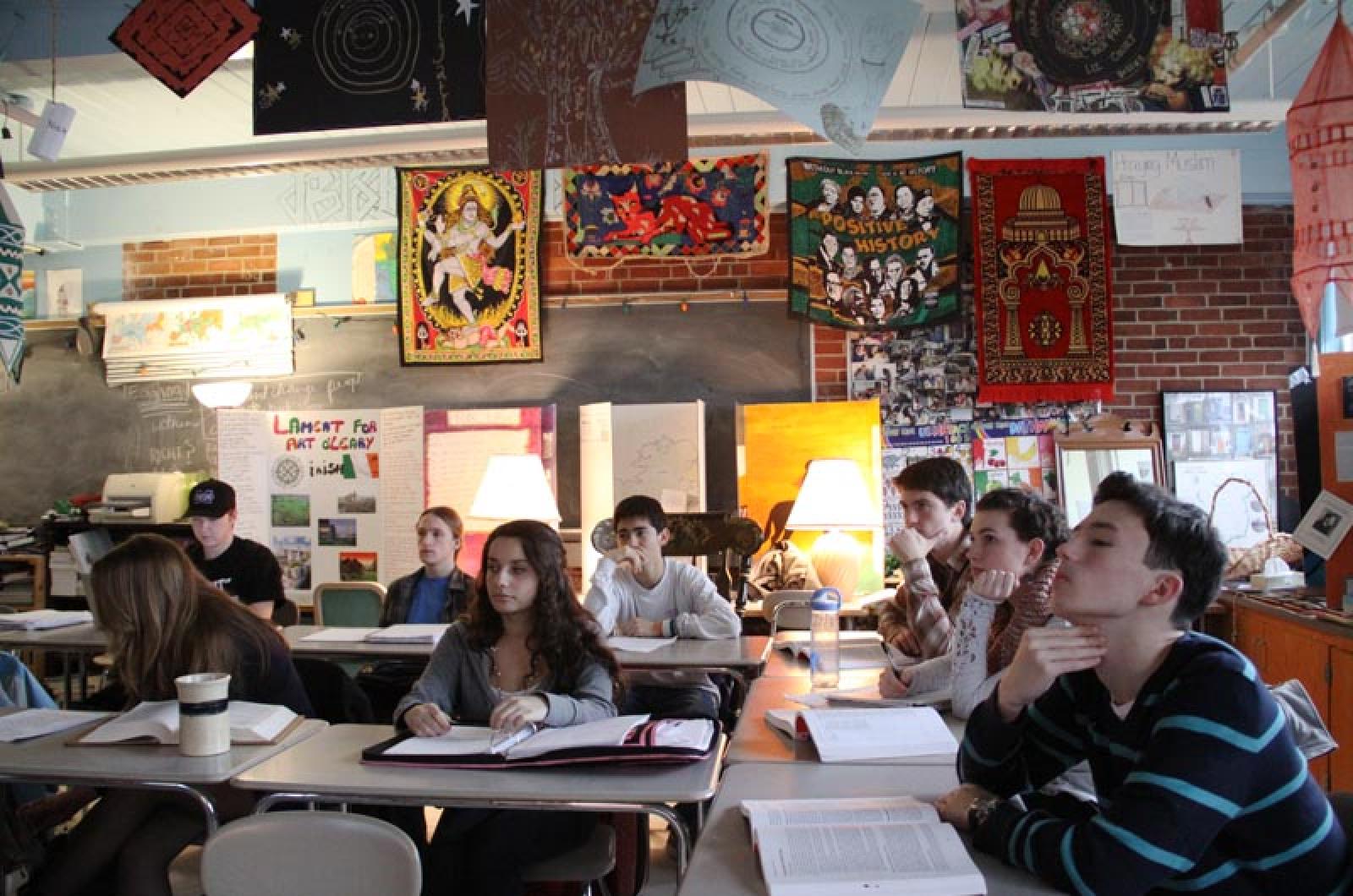An Irish flag hangs next to the chalkboard of Elaine Weintraub’s history class at the Martha’s Vineyard Regional High School.
Chinese lanterns dangle from the ceilings, Buddhist banners drape the walls and the faces of civil rights leaders adorn a sign that reads, “Positive history: Without black history there would be no history.”
The walls of the classroom buzz with multiculturalism, as does the student-produced film Hear Our Voices that will be premiering this Saturday at 7 p.m. at the Martha’s Vineyard Hebrew Center, sponsored by the social action committee of the center and the Two Islands, One World program.
“Instead of trying to make everybody fit into one size that really doesn’t fit all, we are trying to glorify all that we are and all the different things we are,” Mrs. Weintraub said. “The theme of the film is identity, who are we and what do we bring? How can we learn to know and appreciate ourselves and others?”
Potato planting and Brazilian dancing are featured snippets of the film, which documents the projects and discussions of the Irish history, Brazilian history, world history and European history classes.
Mrs. Weintraub’s history classes, students say, go beyond lectures or tests.
Senior Maddie Webster said on the first day of her Irish history class, the students debunked stereotypes of Ireland. In the middle of the semester they planted red, gold and purple potatoes while studying the Irish famine. And at the end of the year, the students celebrated a Celtic ritual at the beach, writing on a small piece of paper a difficulty they experienced in the past year, burning it in the flame of a candle, and throwing the ashes into the ocean.
“And that’s history,” Maddie smiled.
Senior Vitor Mouzinho said the classes foster respect between different cultures.
“She actually cares about the students and how they interact with one another,” Vitor said. “If a new person from Brazil comes here, she tries to introduce them to American culture, and stop segregation.”
Vitor moved from Brazil when he was three years old. Unfortunately, he said, sometimes the Brazilian and American students at the high school do not mix.
“Looking around the lunch room, you see the Brazilians all sit at one table,” he said. “They have a tendency to stick to their groups.”
But it’s not due to hostility, rather a lack of understanding, Vitor said.
“American students sometimes don’t know about Brazilian culture,” and vice versa, he said. “A lot of Americans think Brazil is just one big jungle without buildings or malls. But the classes Mrs. Weintraub has stops that and lets all of them have a glimpse of each other’s culture.”
Through history, Mrs. Weintraub tries to build community and respect in and outside her classes.
“We shortchange all of our kids if we don’t expose them to the diverse world that is out there,” she said. “Our kids will leave here and go to college or go to work off-Island, and they need preparation for that.”
Which is why last year the history department established Two Islands, One World, a peer exchange program where high school students from Martha’s Vineyard and Manhattan visit each others’ Islands and experience the radically different lifestyles each offers.
The showing of the film this weekend will contribute to fund-raising for the April trip.
While the New York students ate fresh lobsters, visited with the Wampanoag tribe and rode in school buses, the Vineyarders dined in Chinatown, went to museums and held on tight in subways during their spring trip.
“I had only seen New York on TV,” said senior Rodrigo Honoratio. “Stepping into New York city was a different lifestyle. Everything you want, everything that we don’t have on the Island, is there.”
The Vineyarders mingled with student city-dwellers of several heritages, including Russian, Chinese, and Dominican Republican, as they spent a day of classes at the High school of Economics and Finance and walked the Brooklyn Bridge.
From one side of the island to another is 45 minutes, but some of the Manhattan students had two-hour commutes just to get to school.
“The journey alone was very different,” Mrs. Weintraub said. “Island kids don’t generally have to deal with many of those concerns. And those are the experiences that actually prepare you for the real world. Their world is no more real than ours, but it’s a world we don’t know.”
On the Vineyard, too, Mrs. Weintraub strives to expose students to the diversity of the world in her classes, whether that be trying a new cuisine or playing music from another country.
“You can cram somebody’s head with whatever you tell them it’s got to be crammed with, or give them tests to convince them it’s the only thing that matters,” she said. “But if they don’t know how to handle themselves in a diverse world, if they can’t get pleasure out of something that is totally different from what they know, then in my mind, they are uneducated.”
Hear Our Voices shows at the Martha’s Vineyard Hebrew Center at 7 p.m. Donations will be accepted.





Comments (1)
Comments
Comment policy »